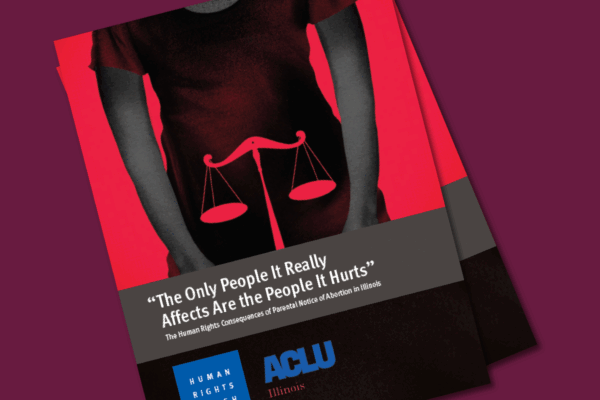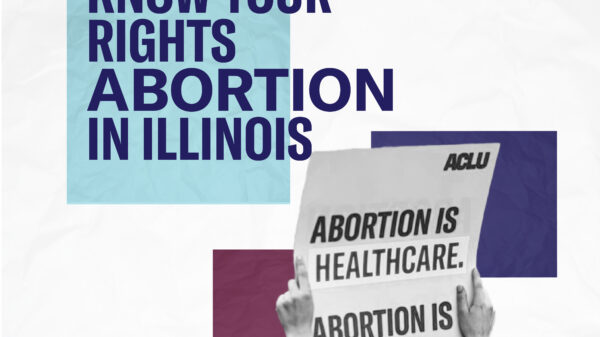Law Violates Young People’s Human Rights, Can Delay Their Care
An Illinois law that requires a young person seeking an abortion to involve an adult family member is dangerous for youth in the state, violates their human rights, and threatens their health and safety, Human Rights Watch and the American Civil Liberties Union (ACLU) of Illinois said in a report released today. The Illinois General Assembly should repeal the law, the Illinois Parental Notice of Abortion Act, as a matter of urgency according to the report.
Under the Parental Notice of Abortion Act, a doctor providing care to a young person under age 18 seeking an abortion in Illinois must notify a designated adult family member – a parent, grandparent, step-parent living in the home, or legal guardian – at least 48 hours beforehand. If there is a reason that the young person is not able to have one of these family members notified, the young person can go to court and ask a judge for permission to have the procedure without this forced family involvement, in a process known as “judicial bypass.”
The 73-page report, “‘The Only People It Really Affects Are the People It Hurts’: The Human Rights Impacts of Parental Notice of Abortion in Illinois,” is the product of a collaboration between Human Rights Watch and the ACLU of Illinois. The groups found that young people often seek judicial bypass because they fear physical or emotional abuse, being kicked out of the home, alienation from their families or other deterioration of family relationships, or being forced to continue a pregnancy against their will. The groups also documented the hardships faced by young people forced to involve unsupportive family members in their abortion decision or navigate an unfamiliar court system to obtain a judicial bypass, and the additional stress and delays in seeking care this caused.
“This law may force young people to continue pregnancies against their will or to endure abuse, humiliation, and punishment by unsupportive parents,” said Margaret Wurth, the lead author of the report and a senior researcher at Human Rights Watch. “And their alternative as they try to make decisions about their own bodies and lives may be to face a difficult and even traumatizing court experience.”
Human Rights Watch conducted in-depth interviews with 37 people – including attorneys, healthcare providers, a retired judge, and others – and analyzed approximately three-and-a-half years of data and other information gathered by the ACLU of Illinois concerning young people who have gone through the judicial bypass process.
Human Rights Watch also assessed the law in light of international human rights standards. Human rights experts have consistently called for the removal of barriers that deny access to safe and legal abortion, and have commented specifically on parental involvement requirements posing a barrier to abortion care. Human Rights Watch concluded that Illinois’ forced parental notice law violates a range of human rights for young people, including the rights to health, to be heard, to privacy and confidentiality, to nondiscrimination and equality under the law, to decide the number and spacing of children, and to be free from cruel, inhuman or degrading treatment.
The ACLU of Illinois operates a Judicial Bypass Coordination Project to provide free legal assistance to youth impacted by the law, representing more than 500 young people in the past seven years since the law went into effect in judicial bypass proceedings around the state. Of this number, only one young person’s request for a bypass was ultimately denied.
“After years of representing young people before judges in bypass cases around the state of Illinois, it is clear that this law is unnecessary and harmful,” said Emily Werth, a staff attorney at the ACLU of Illinois. “The law should protect young people seeking to end a pregnancy, not erect unnecessary barriers and delays that stand between them and receiving safe health care from a qualified provider.”
The groups noted that most young people involve a close family member in their decision to terminate a pregnancy regardless of any law, and when young people seeking abortion do not talk to a parent, they have good reasons. A healthcare provider relates in the report that one patient under 18 seeking abortion care told her: “My mother is very strict with me. If she knows I’m pregnant, she’ll definitely throw me out of the house.”
The groups also found that the notice law can lead to significant delays for young people that affect their access to medical care. Working with a lawyer and surreptitiously arranging for a court appearance adds a week on average (and sometimes much more) to a young person’s timeline of obtaining abortion care. Those days can be critical – a young person may pass the point of eligibility for a noninvasive medication abortion, or may need a procedure requiring multiple appointments over consecutive days.
One young person forced to go to court to seek a judicial bypass described the process as “very stressful and nerve wracking.” Another said, “It was scary at first not knowing what to expect.”
The report also presents cases in which young people were forced to continue a pregnancy against their wishes because they were unable to comply with the notice law or navigate judicial bypass, or because their parents interfered in their decision and prevented them from accessing abortion care. Describing one such case, a social worker interviewed for the report said her patient became “a prisoner in her own home,” when her parents prevented her from accessing abortion care and forced her to continue a pregnancy. “Her autonomy was completely removed, taken away from her,” the social worker said.
Earlier this year, Illinois State Senator Elgie R. Sims, Jr. and State Representative Anna Moeller introduced measures in both Illinois General Assembly chambers aimed at repealing this harmful law – SB 2190 and HB 1797, respectively. Votes are anticipated in both chambers before the end of May 2021.
“Illinois leaders have repeatedly affirmed their commitment to protecting reproductive rights in the state,” Wurth said. “Passing legislation to repeal the parental notification act is essential to fulfilling that commitment.”
For the Human Rights Watch Report, please visit:
https://www.hrw.org/report/2021/03/11/only-people-it-really-affects-are-people-it-hurts/human-rights-consequences
To read an interview on the potentially dangerous consequences of this law, please visit:
https://www.hrw.org/news/2021/03/11/interview-law-putting-illinois-young-people-risk
For more Human Rights Watch reporting on abortion, please visit:
https://www.hrw.org/topic/womens-rights/reproductive-rights-and-abortion
For more Human Rights Watch reporting on sexual and reproductive health and rights, please visit:
https://www.hrw.org/topic/health/sexual-and-reproductive-health
For more ACLU of Illinois reporting on women’s and reproductive rights, please visit:
https://www.aclu-il.org/en/issues/reproductive-rightsissues2/reproductive-rights



